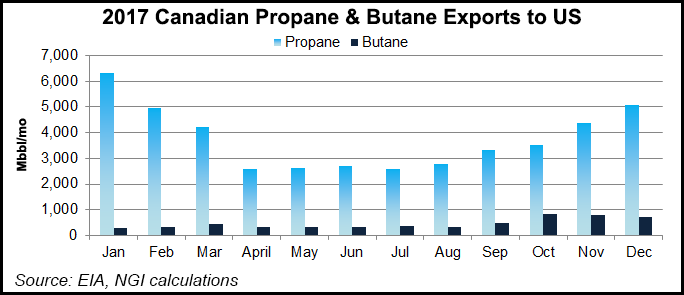Markets | NGI All News Access | NGI The Weekly Gas Market Report
Canadian Exports to U.S. Boosted by Propane, Butane Sales
Liquid byproducts add a rich bonus to Canadian natural gas exports to the United States, show trade scorecards kept by the National Energy Board (NEB).

Cross-border propane and butane sales fetched C$2.4 billion (US$1.9 billion) in 2017, giving a 23% boost to the C$10.3-billion (US$8.2-billion) value of Canadian gas production for American markets last year.
Unlike gas, liquid byproducts stand out as a growth item in Canada-U.S. trade.
While Canadian gas exports were flat at 8.2 Bcf/d in 2017, up only 1% from 8.1 Bcf/d in 2016, the volume of southbound cross-border propane and butane sales grew by 26% to 61.2 million barrels from 48.7 million barrels.
Also unlike gas, Canadian liquid byproducts exports do not depend on additions to pipeline networks hampered by intricate regulatory processes slowed down by environmental and aboriginal resistance.
Railways carry about 86% of Canadian propane and butane exports into the United States, giving exporters flexibility to shop around for sales opportunities. The evolving trade pattern likely includes blending Canadian production into growing American overseas exports, indicates the NEB.
A direct Canadian entry into the global propane tanker trade is under construction for C$450-$500 million (US$360-$400 million) on the northern Pacific coast of British Columbia at Prince Rupert.
Calgary-based Altagas Ltd. and Dutch storage specialist Royal Vopak have set a target of first-quarter 2019 to start 1.2 million tonnes (14 million barrels) per year of exports by the Ridley Island Propane Export Terminal (RIPET) partnership.
Unlike crude oil tanker exports — but like liquefied natural gas (LNG) shipping — ocean propane traffic has political blessing from British Columbia’s left-leaning, avowedly environmental New Democratic Party government. On a visit to the terminal construction site last fall, BC Premier John Horgan endorsed RIPET as a job-creating foray into global sales of clean-burning fuel. A government statement in the BC capital, Victoria, called the project “an excellent model for the province’s vision of expanding sustainable resource production.”
Growing volumes of Canadian propane are flowing from liquids-rich Montney shale gas deposits in northern BC and Alberta. RIPET boasts highly competitive global market access, claiming 10-day shipping times to Asia, or less than half the 25-day sailing times from U.S. terminals on the Gulf of Mexico coast.
© 2024 Natural Gas Intelligence. All rights reserved.
ISSN © 1532-1231 | ISSN © 2577-9877 | ISSN © 1532-1266 |
